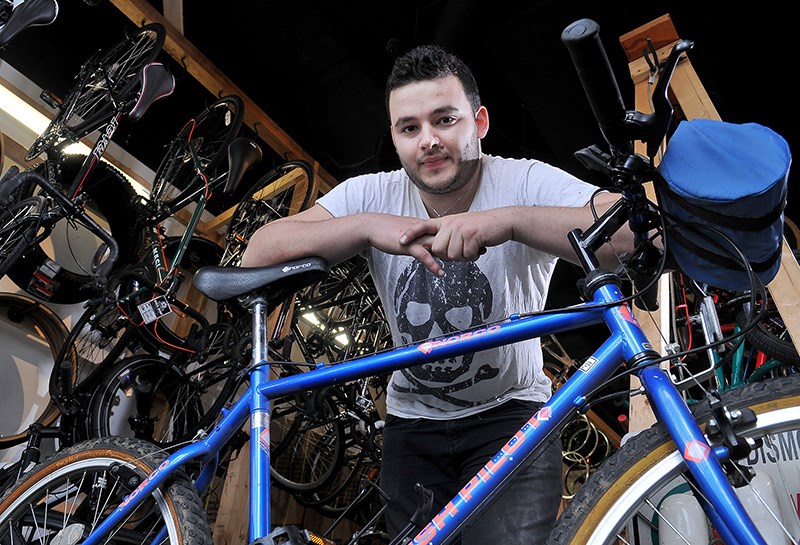You don’t need a $5,000 carbon fibre racing bike with disc brakes and the latest electronic shifting system to bike to work.
Save that for the weekend warriors.
James Parlati can set you up for less than a tenth of that. Or even just one per cent if you already own a bike and it just needs a tune-up.
The manager of Ride-On Bike Shop on Westwood Street says riding to and from work is a lot different than riding 100 kilometres on a Saturday morning with your Lycra-clad buddies.
And a heck of a lot cheaper.
“You don’t have to be on an expensive bike,” says Parlati, whose shop specializes in fixing up and selling used bikes. “You just need something you’re comfortable riding.”
Parlati says now that the weather is finally improving, he’s seeing more and more people come through his door looking for a bike that will reliably get them to work and back, or want to get a bike that’s been sitting neglected in the garage or basement back on the road so they can leave the car in the garage instead.
Emma Cunnington, the Bike to Work Week manager at the cycling advocacy group HUB Cycling, says Parlati’s not just spinning spokes.
In fact, 2% of trips in Metro Vancouver are now made by bike and 10% of work trips in Vancouver are done on the bike, says Cunnington.
“Cycling is the fastest growing mode of transportation in Metro Vancouver.”
To push that growth even further, HUB is holding the first of its two seasonal Bike to Work Weeks between May 29 and June 4.
The event raises awareness and encourages commuting by bike as a way to save money, improve personal fitness and health and ease traffic congestion. It can also be fun, says Cunnington.
“It will make you feel happier.”
Parlati says that happiness starts with having the right equipment, including a bike that can handle the terrain and route you’re riding.
If your ride to work takes you on dirt or gravel trails, you may want the fatter tires and heftier frame of a mountain bike beneath you. If you ride mostly on the road with occasional dabs onto trails, you may consider a hybrid bike; it’s a cross between a mountain and road bike with wider tires and a more upright position for comfort and visibility.
Either way, says Parlati, you should ensure the drivetrain and brakes are properly maintained and the tires are puncture-resistant.
“You don’t want to start out right away with a flat.”
Cunnington says infrastructure improvements throughout Metro Vancouver are also making it easier and safer for cyclists. One of her organization’s mandates is to work with municipalities to identify safety issues and to build a comprehensive network of linked bike routes to convey cyclists all across the region.
“Any infrastructure that goes up, we see more people biking,” says Cunnington.
BIKE TO WORK WEEK
As part of Bike to Work Week, HUB Cycling is hosting a number of celebration stations across Metro Vancouver, including two in the Tri-Cities at:
• Ioco and Murray in Port Moody on Tuesday, May 30, from 6:30 to 9 a.m.
• Foster and Poirier in Coquitlam on Wednesday, May 31, from 3:30 to 6 p.m.
The stations are manned by volunteers and supplied with information about bike routes, snacks and prizes.
HUB Cycling’s Tri-Cities local committee is also hosting a group ride on Sunday, May 28.
For more information join the TriCities Bike HUB Facebook page or go to www.bikehub.ca/btww



